Mujib and the Declaration of Independence
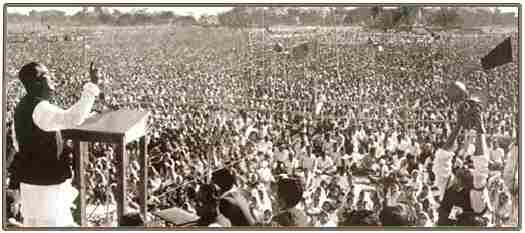 The vow to reveal the rights and wrongs of the history of our Liberation War, and to give individuals the credit they deserve, is a welcome gesture on the part of the caretaker government. The chief of the army General Moeen U. Ahmed has made an overt declaration that they will settle the long-standing disputes about the history of our independence, and deal with them fairly and squarely on the basis of fact.
The vow to reveal the rights and wrongs of the history of our Liberation War, and to give individuals the credit they deserve, is a welcome gesture on the part of the caretaker government. The chief of the army General Moeen U. Ahmed has made an overt declaration that they will settle the long-standing disputes about the history of our independence, and deal with them fairly and squarely on the basis of fact.
This sounds very good indeed, especially to those who want to read an undisputed history of our Liberation War, which has undergone huge distortion at the hands of vested quarters and political governments. Party intellectuals held repeated postmortems of history to use it in their favour. This tug of war with our history has caused serious harm to our national integrity. The impressionable young learners have been the worst victims of this. They are confused with the frequent changes in the historical accounts, which are in a state of flux in keeping with the change of the governments.
This long-drawn-out hostility between the two major rival parties, Bangladesh Awami League (AL) and Bangladesh Nationalist Party (BNP), revolves around their two political idols — Mujib and Zia.
The caretaker government seems to be making an attempt to bury the hatchet between these two parties by settling the dispute about who really declared independence of Bangladesh.
The government appears to be taking a conciliatory step to please both the parties. It seem to be keener on mediation than on unearthing the truth.
The government recognises Mujib as the Father of the Nation and Zia as the declarer of independence on Mujib’s behalf. This is good. Mujib was the undisputed leader of our independence and deserves this appellation, regardless of anybody’s recognition. And Zia read out the declaration note on behalf of Mujib on March 27, 1971.
This is surely based on hard fact, but the question is how far this reading out of the declaration note of March 27 could be considered as the formal declaration of the independence of Bangladesh, which was virtually made on March 26, 1971. History should be treated dispassionately, with cool and clinical impersonality. It does not bother about negotiations. So the facts about the declaration of our independence should be taken into consideration by the government.
It is Mujib and only Mujib who, for the first time, formally made the declaration of the independence of Bangladesh on March 26, 1971. S. A. Karim in his Sheikh Mujib: Triumph and Tragedy writes that the wife of M.R. Siddiqi was given over telephone an urgent message from Bangabandhu received through the wireless operators of Chittagong. The message reads as follows:
“Message to the people of Bangladesh and the people of the world. Rajarbagh police camp and Peelkhana EPR suddenly attacked by Pak Army at 2400 hours. Thousands of people killed. Fierce fighting going on. Appeal to the world for help in freedom struggle. Resist by all means. May Allah be with you. Joy Bangla.”
This message from Bangabandhu was then taken as the declaration of independence, which was read out by M.A. Hannan, general secretary of district (Chittagong) Awami League at 2:30 p.m. On this basis, March 26 was declared Independence Day.
The declaration of independence made by Major Zia took place on the following day (March 27,1971). As a matter of fact, Zia made two speeches. In the first speech, he claimed himself as the president of Bangladesh and urged upon the people to fight the Pakistan army.
When this unauthorised speech created confusion among the people, the Awami League leaders asked Zia to read out a text prepared by A. K. Khan to nullify the effect of the speech he had previously made. Zia followed the suggestion and made a second speech, where he categorically mentioned that he was speaking on behalf of Bangabandhu Sheikh Mujibur Rahman, the great national leader. Had there been some other army official, a major or a colonel or the like, the effect would have been the same. Moreover, March 27 has not been declared Independence Day on the basis of Zia’s declaration.
So, Zia should not be said to have declared independence of Bangladesh. He only read out the message of declaration on behalf of Mujib, which, too, has an historic significance that was duly recognised by the Mujibnagar government. In addition, the constitution, which was accepted as the “Declaration of Independence” on April 10, 1971, by 403 elected MPAs and MNAs also bears the testimony to the declaration of independence by Bangabandhu.
Under that constitution was formed the first government of independent Bangladesh (Mujibnagar Government) with Mujib as the first president. The constitution of 1972 was later written in the light of that constitution. As it is put in the sixth section of that constitution (Declaration of Independence):
“Whereas in the facts and circumstances of such treacherous conduct Bangabandhu Sheikh Mujibur Rahman, the undisputed leader of 75 million people of Bangladesh, in due fulfillment of the legitimate right of self-determination of the people of Bangladesh duly made a declaration of independence at Dacca on March 26, 1971 …”
Again, in Section 10 of that constitution, Mujib’s declaration of independence is confirmed:
“We the elected representatives of the people of Bangladesh … thereby confirm the Declaration of Independence already made by Bangabandhu Sheikh Mujibur Rahman”
That Mujib declared independence is an historical truth, which is properly substantiated by the Declaration of Independence of April 10, 1971, which can be considered as the precursor of the constitution of 1972. Bangabandhu is regarded the Father of the Nation for his contribution to the birth of our nation. Although this is a much bigger thing than being the claimant for a declaration, nevertheless, facts cannot be reduced to fantasies.
To show Mujib as the architect of the declaration of independence has got very little to do with his being the founding father of the nation. Even then, all these arguments can be ignored, but the course of history cannot be changed. This is what history is. We can hold it down or repress it. But we cannot stop it. The caretaker government should take great care of the history of the liberation war, bring all these into consideration, and go about the job of amending the text books of the primary and secondary classes in right earnest.
Author : Dr. Rashid Askari, writer, columnist and Professor of English, Islamic University, Kushtia.


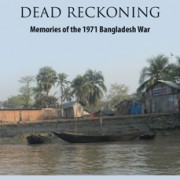
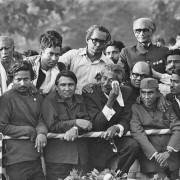
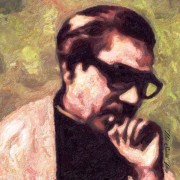
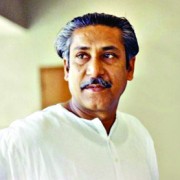
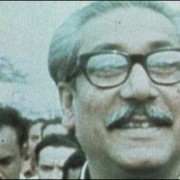
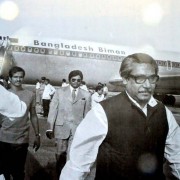






-80x80.jpg)
